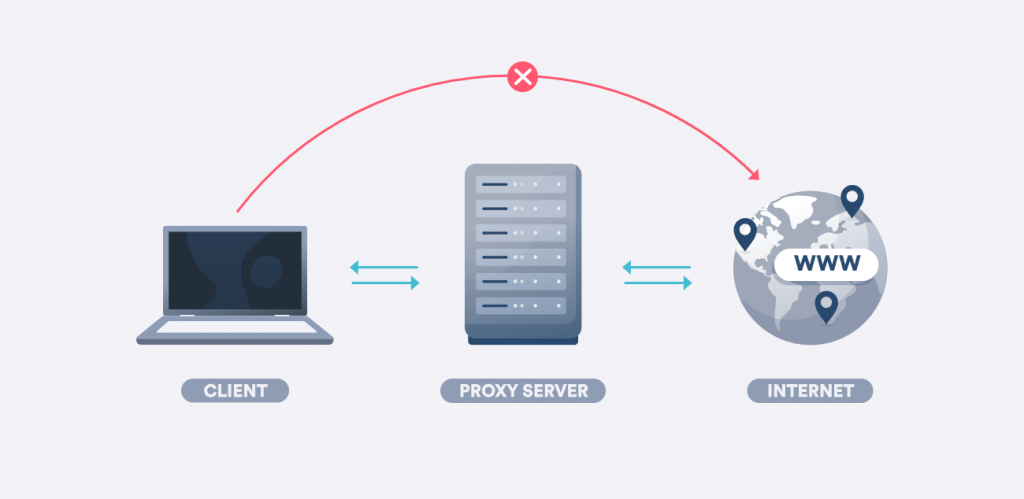Proxy servers are redefining online access in a time when the Internet is central to our lives. They serve as intermediaries, circumventing restrictions on unrestricted web perusing. Proxy servers allow access to otherwise-restricted content and increase privacy by concealing IP addresses by rerouting user requests through multiple servers. Proxy usage ranges from circumventing government censorship to bolstering corporate security.
This article examines the mechanics, types, advantages, and potential disadvantages of proxy server usage. As we investigate their function in optimising online experiences, it becomes clear that intermediaries hold the key to a more seamless and limitless virtual universe.
The role of proxy servers
In a time when the digital landscape is both diverse and expansive, proxy servers have emerged as crucial components that redefine how we interact with the Internet. These versatile intermediaries have evolved beyond simple website access tools; they now play crucial roles in enhancing privacy, circumventing restrictions, optimising content delivery, and protecting online activities. The use of residential rotating proxies adds a dimension of complexity that elevates the significance of these tools in our digital lives, in addition to their many other functions.

Avoiding geographical restrictions
One of the primary functions of proxy servers is to circumvent geographical restrictions. Geographical barriers can prevent users from accessing region-specific or blocked content and services in their own country. Proxy servers enable users to circumvent these restrictions by rerouting web requests through servers located in regions where the content is accessible. This has significant implications for global connectivity, allowing individuals to experience the Internet as a borderless entity that facilitates cross-cultural exchanges and the dissemination of information.
Increasing privacy and safety
In the digital age, proxy servers, including the innovative concept of residential rotating proxies, have emerged as champions of privacy and security. Traditional proxies conceal the IP addresses of their users, making it difficult for websites and online services to monitor their online activities. However, residential rotating proxies go one step further by utilising a dynamic reservoir of IP addresses derived from actual residential devices. This rotation of IP addresses increases anonymity by making it difficult for third parties to track and monitor the online activities of users. As a consequence, users can engage with the Internet with greater assurance regarding their privacy.
Increasing content delivery rate
Optimising content transmission is essential for a seamless online experience in an age where content consumption is paramount. This is because proxy servers cache frequently accessed content. When users request cached content, the proxy server delivers it directly, decreasing load times and alleviating network strain. This is especially advantageous in corporate environments where content delivery efficiency is essential for productivity. By decreasing the amount of time users spend waiting for content to load, proxy servers improve user engagement and contentment.

Observation and filtration
Proxy servers offer organisations seeking a balance between productivity and security the ability to monitor and control internet usage. Administrators can implement content filtering to restrict access to particular websites, ensuring that employees remain focused on work-related duties and reducing the likelihood of security breaches. This level of control is particularly advantageous in environments where regulatory compliance and data protection protocols are crucial.
Web scraping in anonymity
Frequently, businesses use web crawling to collect valuable data for market research, competitor analysis, and other purposes. In this context, residential rotating proxies play a crucial function. As IP addresses are constantly changing, they enable businesses to scrape web data without divulging their identity. This enables organisations to collect data in an ethical and efficient manner while respecting the ethical boundaries of online engagement.
Load balancing and network performance
Proxy servers also contribute to load balancing and optimising network performance. By distributing incoming traffic across multiple servers, they prevent any single server from being overwhelmed, thereby enhancing the overall stability and efficiency of the network. This role is crucial in ensuring that websites and online services remain accessible even during peak usage periods.

Conclusion
Proxy servers are significantly more than intermediaries between users and the Internet. Their responsibilities include circumventing restrictions, enhancing privacy, accelerating the delivery of content, and facilitating the collection of responsible data. By continuously changing the IP address used for online interactions, the introduction of residential rotating proxies introduces a dynamic element that further improves privacy and security. These tools are indispensable mechanisms that redefine the boundaries of online access and anonymity, paving the way for a more secure, unrestricted, and engaging Internet experience.
For even more pieces like this, head on over to our features section.